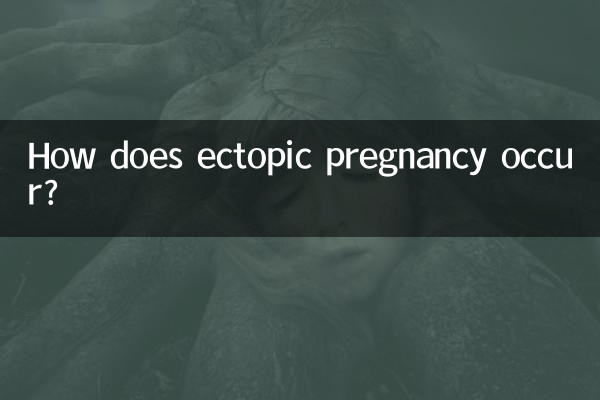How does ectopic pregnancy occur?
Ectopic pregnancy (ectopic pregnancy) refers to the implantation and development of a fertilized egg outside the uterine cavity. It is a common gynecological emergency. In recent years, the incidence of ectopic pregnancy has increased and has attracted widespread attention. This article will combine the hot topics and hot content on the Internet in the past 10 days to analyze in detail the causes, symptoms, diagnosis and preventive measures of ectopic pregnancy, and present relevant information through structured data.
1. Causes of ectopic pregnancy

The occurrence of ectopic pregnancy is related to many factors. The following are the main causes:
| Cause classification | Specific instructions |
|---|---|
| Fallopian tube abnormalities | Fallopian tube inflammation, adhesions, congenital malformations, or surgical damage prevent the fertilized egg from properly passing through the fallopian tube and into the uterus. |
| endocrine factors | Abnormal hormone levels (such as luteal insufficiency) may affect the transport and implantation of fertilized eggs. |
| assisted reproductive technology | Artificial assisted reproductive technologies such as in vitro fertilization may increase the risk of ectopic pregnancy. |
| Contraceptive failure | The risk of ectopic pregnancy may increase after the use of intrauterine devices or birth control pills fails. |
| other factors | Smoking, age (≥35 years old), past history of ectopic pregnancy, etc. |
2. Common symptoms of ectopic pregnancy
Early ectopic pregnancy may have no obvious symptoms, but as the embryo develops, you need to be alert to the following symptoms:
| symptom | frequency of occurrence | illustrate |
|---|---|---|
| Menopause | 70%-80% | Most patients have a history of 6-8 weeks of menopause. |
| stomach ache | More than 90% | Sudden severe pain in the lower abdomen, which may be accompanied by radiating pain in the shoulder. |
| vaginal bleeding | 50%-60% | The amount is small and dark red, which is different from menstruation. |
| shock | severe cases | Occurs when a fallopian tube ruptures, causing heavy bleeding. |
3. Comparison of diagnosis and treatment data
According to recent medical statistics, the diagnosis and treatment methods for ectopic pregnancy are as follows:
| diagnostic methods | Accuracy | Treatment | Applicable situations |
|---|---|---|---|
| Blood HCG test | 95% | drug treatment | Early stage unruptured, embryo ≤4cm |
| Ultrasound examination | 85%-90% | laparoscopic surgery | Fallopian tubes not ruptured |
| posterior fornix puncture | emergency diagnosis | laparotomy | Heavy bleeding or shock |
4. Effective measures to prevent ectopic pregnancy
Based on recent medical advice, you should pay attention to the following to prevent ectopic pregnancy:
1.Timely treatment of gynecological inflammation: Pelvic inflammatory disease and salpingitis are the main causes of ectopic pregnancy and require standardized treatment.
2.scientific contraception: Reduce the number of artificial abortions and avoid repeated uterine cavity operations.
3.Monitoring of high-risk groups: Those with a history of ectopic pregnancy or fallopian tube surgery should undergo ultrasound examination in early pregnancy.
4.lifestyle adjustments: Risks can be reduced by quitting smoking and avoiding early sexual intercourse (<18 years of age).
5. Recent hot discussions
1.Assisted reproductive technology controversy: Whether IVF technology increases the risk of ectopic pregnancy has become a hot topic. Experts point out that standard operation can control the risk to 5%-8%.
2.emergency contraceptive pills: The latest research shows that the risk of ectopic pregnancy after levonorgestrel contraceptive failure is 1.1%, which is three times higher than ordinary pregnancy.
3.Progress in minimally invasive surgery: Single-port laparoscopy technology has become a new treatment option, and the postoperative pregnancy rate can reach 65%.
In summary, the occurrence of ectopic pregnancy is the result of a combination of factors. By understanding the risk factors, identifying symptoms early and standardizing treatment, the harm can be effectively reduced. It is recommended that women of childbearing age have regular gynecological examinations and seek medical attention promptly if they experience any abnormal symptoms.

check the details

check the details